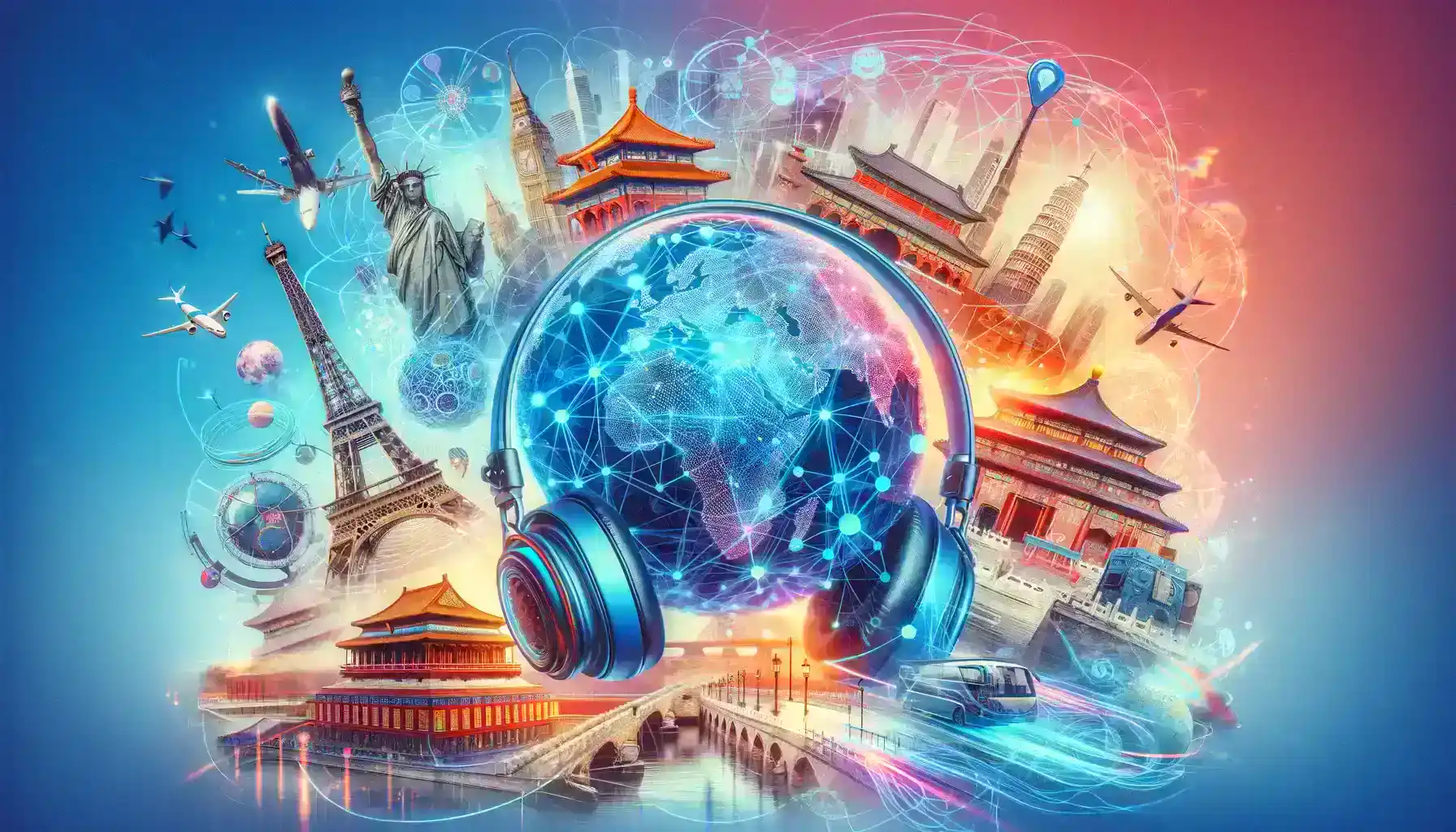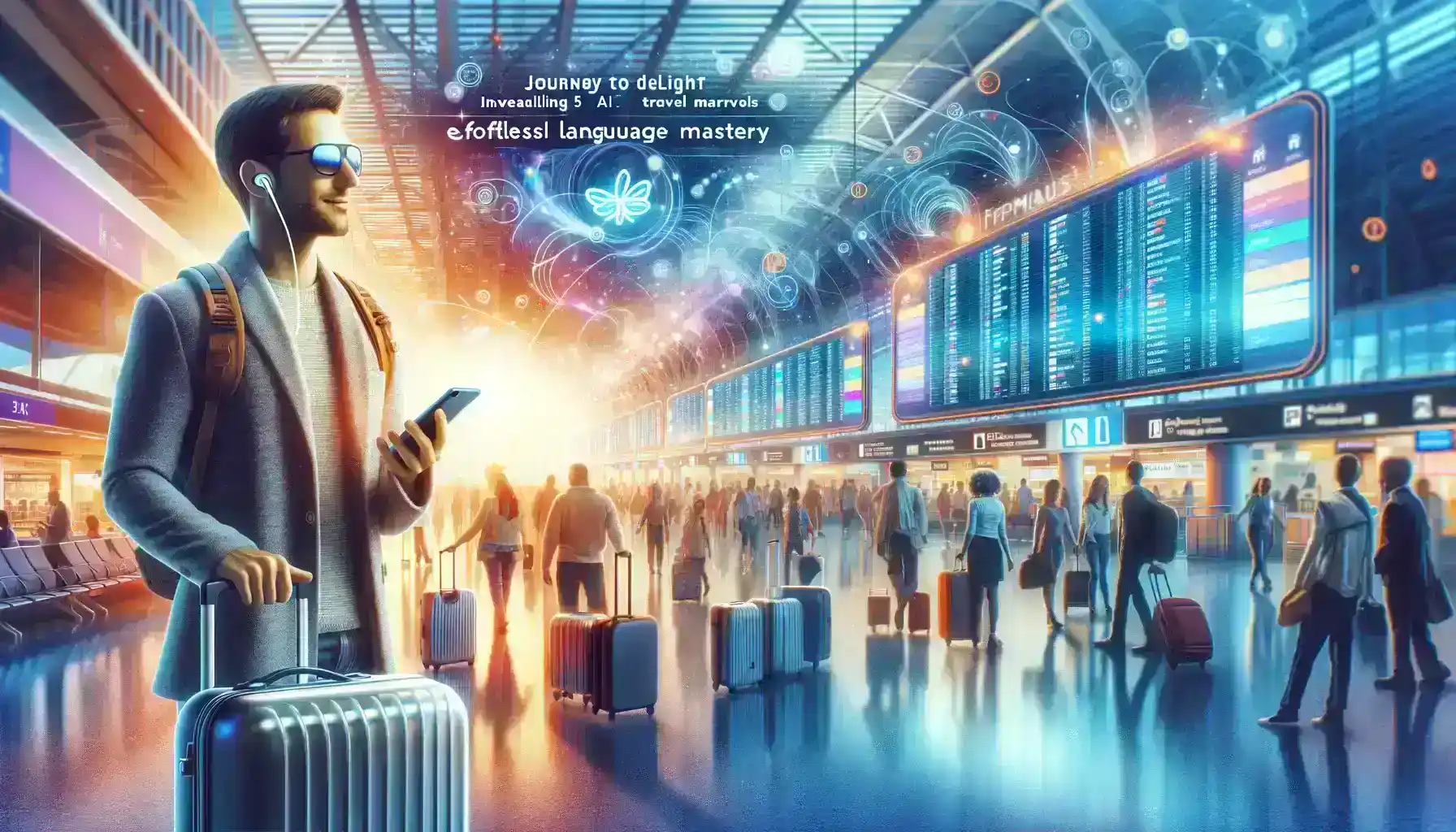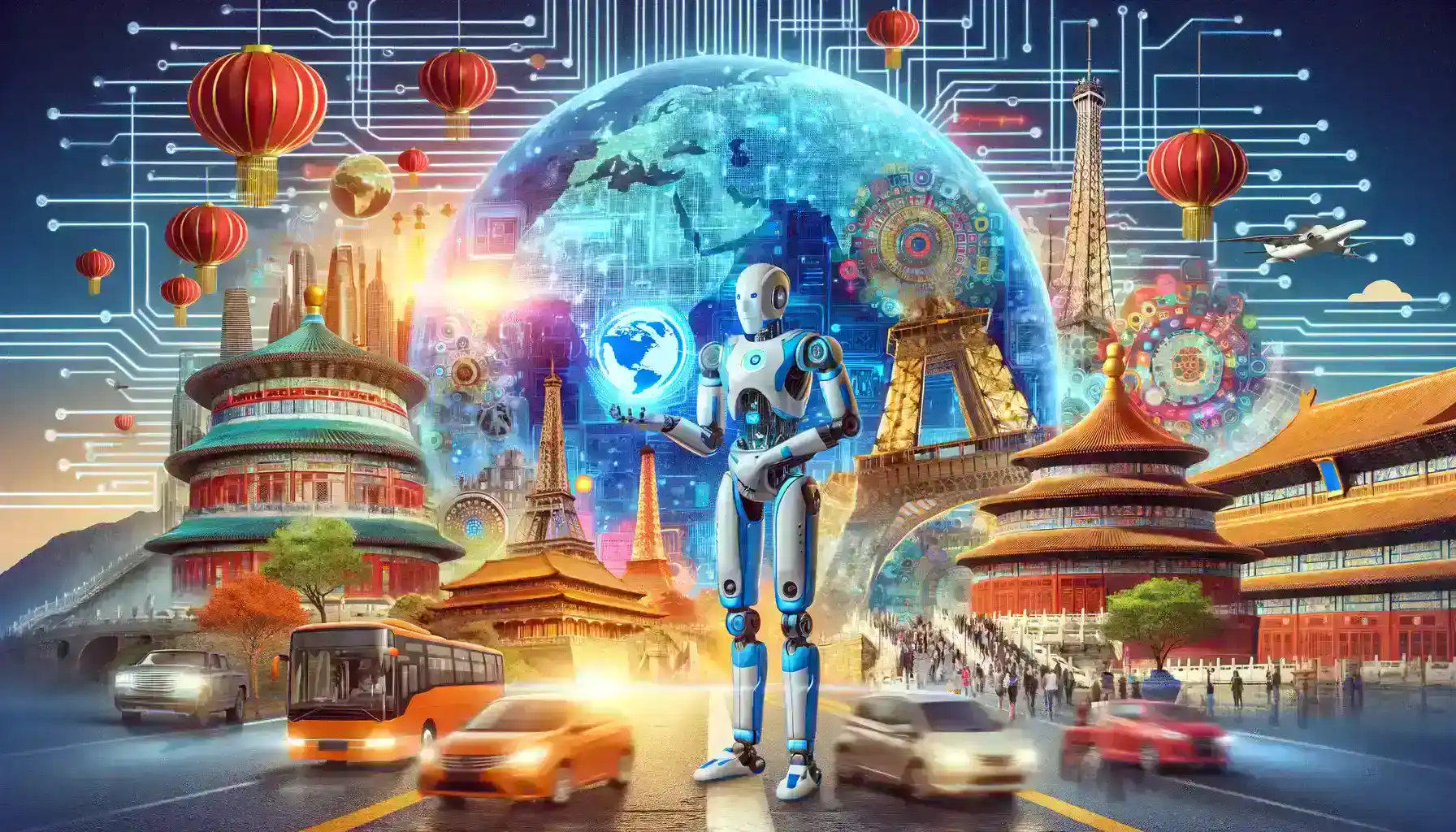Table of Contents
AI in Travel and Tourism
The dawn of the 21st century ushered in an era of unprecedented technological advancement, with Artificial Intelligence (AI) leading the charge. In the dynamic sphere of travel, AI has emerged as a transformative force, promising seamless international journeys. The integration of AI in travel has revolutionized the way we explore our world, breaking down language barriers and crafting personalized experiences. As we stand at the cusp of a new era, let’s delve into the next-gen breakthroughs making this possible.
AI in travel is revolutionizing how we plan, book, and experience our journeys. From intelligent recommendation engines that curate bespoke itineraries to real-time language translation devices that bridge communication gaps, AI’s applications in the travel industry are expansive and transformative.

1. Real-Time Translation Devices
AI in Travel, real-time translation technology has been a game-changer. Leveraging advanced AI algorithms, these tools interpret and translate spoken language almost instantaneously, facilitating clear and accurate cross-linguistic communication. This innovation uses a combination of speech recognition, language processing, and machine translation to break down spoken words into text, translate them into the desired language, and reproduce them audibly. It’s a complex symphony of AI technologies working in tandem to emulate a human translator’s efficiency and understanding.
Impact on traveler experience
The impact of real-time translation technology, a stellar example of AI in Travel, on the traveler experience is profound. It eradicates the anxiety associated with language barriers, enabling travelers to interact with locals, understand signs and menus, and immerse themselves fully in the culture without fear of miscommunication.
Travelers can forge connections with people from all walks of life, fostering a deeper understanding and appreciation of the diversity that exists in the world. Moreover, this technology can enhance safety by allowing travelers to comprehend important announcements and navigate emergency situations where understanding the local language is crucial.
Example of a Breakthrough Product or Service
A notable breakthrough product in the AI in Travel space is the “LingoLink,” a state-of-the-art wearable translation device. LingoLink sets the standard for discreet, stylish, and highly advanced AI-powered translation. With support for over 70 languages, LingoLink goes beyond simple translation, offering a seamless and immersive language experience for travelers. Its bidirectional translation ensures that every conversation is smooth, clear, and meaningful, bridging language barriers effortlessly.
2. AI-Powered Travel Assistance Apps
Mobile travel assistance applications are at the forefront of integrating AI in travel, offering a suite of services that were once the domain of human travel agents. These applications utilize AI to sift through massive datasets, analyzing patterns to provide real-time travel insights, make predictions, and automate routine tasks. Another brilliant example of enhancing travelers’ experience in companies is using corporate travel companies. For instance, TravelPerk offers business travel solutions that simplify and streamline corporate travel management.
The intelligence of these systems evolves with each interaction, continually refining their accuracy and relevance to the user’s preferences, leading to a more customized travel experience with every use. AI can understand users’ preferences and interests, so it can tailor and adapt suggestions accordingly. For example, if a user traveling across Europe is interested in historical travel, AI might recommend lesser-known hotspots and unique experiences, such as the Band of Brothers tour in Normandy, due to its significance for history enthusiasts.
User Benefits and Accessibility
The proliferation of AI in travel apps has democratized travel planning, making it more accessible and personalized than ever before. Travelers benefit from AI’s 24/7 availability, obtaining assistance at any time without human intervention. These apps streamline the planning process, reduce the cognitive load on travelers by making decisions simpler, and offer cost-effective alternatives by finding the best deals through predictive analytics.
Highlighting an Innovative App in this Space: JourneyGenius
JourneyGenius exemplifies the cutting-edge application of AI in travel. This app takes the hassle out of travel planning by organizing essential documents and suggesting activities that align with individual preferences and situational variables such as weather and local festivities.

3. Smart Accommodation Services
The incorporation of AI in travel, specifically within accommodations, is setting new standards for personalization. Smart hotel rooms that adjust to a guest’s preferences in lighting, temperature, and entertainment are just the beginning.AI systems analyze data from previous stays, allowing hotels to customize room amenities and services to individual tastes and needs.
Enhancing Communication and Services for Travelers
AI in travel is revolutionizing the way hotels and service providers communicate with travelers. Chatbots powered by AI serve as round-the-clock concierges, handling reservations, answering inquiries, and solving problems with speed and efficiency that were previously unattainable.
Case Study
A leading example of AI in travel is the forward-thinking approach adopted by “WanderLux Hotels.” This hotel chain has embraced AI technology by integrating it seamlessly into their operations. WanderLux Hotels’ AI platform is deeply intertwined with their booking system, enhancing the guest experience in unique ways. It enables guests to enjoy personalized room selections based on their past preferences, making each stay feel tailor-made.
4. AI-Enhanced Cultural Experiences
AI in travel has transcended beyond mere logistics, venturing into the realm of cultural enlightenment. Interactive AI tools are now capable of offering immersive cultural experiences, allowing travelers to delve deep into the traditions and heritage of their destinations. These tools, through the synthesis of virtual reality and AI, can simulate historical events, recreate lost architectures, and offer virtual tours narrated by AI guides that adapt to the user’s interests.
The integration of AI in travel thus serves not just as a technological marvel but as a digital bridge to global cultures.
Bridging Language and Cultural Gaps
The ethos of AI in travel is to create a world without borders, and this is vividly seen in its ability to bridge language and cultural gaps. AI-powered translation apps and devices are now indispensable travel companions, offering real-time translation that enables fluid conversation between different language speakers.
AI systems are being trained to recognize and interpret body language and social norms, alerting travelers to culturally sensitive practices, thus avoiding faux pas. Furthermore, AI-driven platforms provide contextual information on cultural sites, translating not only the language but also conveying the significance and stories behind local customs and traditions.
The result is a travel experience that is not only linguistically seamless but also culturally coherent, fostering deeper connections between travelers and the communities they visit.
Profile of a Platform Providing This Experience
One platform that exemplifies the fusion of AI and cultural exploration is CultureConnect. This platform employs AI to offer interactive experiences that cater to the culturally curious traveler. With its sophisticated AI engine, CultureConnect serves as a personal museum guide, interpreting artworks and exhibits while providing historical context in multiple languages.
With AI at its core, it’s helping to pave the way for a future where every journey is an opportunity for profound cultural connection.

5. Predictive Travel Analytics
In the realm of AI in travel, predictive analytics stands out for its ability to tailor travel experiences like never before. By analyzing large datasets, AI can uncover hidden patterns and preferences unique to each traveler.
For instance, if a traveler frequently books seaside hotels, AI can prioritize beachfront properties in their search results and suggest coastal activities for their next trip. The result is a highly personalized itinerary that feels handcrafted. This aspect of AI in travel not only enhances customer satisfaction but also increases the likelihood of repeat bookings for travel providers, creating a virtuous cycle of personalized offerings and customer loyalty.
Improving Travel Safety and Convenience
AI in travel also plays a pivotal role in enhancing safety and convenience. By processing real-time data from various sources, AI can predict risks and suggest preventive measures. For example, it can alert travelers about potential weather disruptions, political unrest, or health advisories in planned destinations, enabling them to make informed decisions.
In emergencies, AI-powered systems can reroute travelers to safety, coordinate with local authorities, and provide travelers with immediate, reliable information. This proactive approach powered by AI not only safeguards travelers but also builds trust and reliability in travel services.
Leading Company in Predictive Travel Analytics
Among the pioneers leveraging AI in travel is TravelAI, a company at the forefront of predictive travel analytics. TravelAI‘s platform aggregates vast amounts of travel-related data, from economic indicators to social media sentiments, to forecast travel trends and consumer behavior.
TravelAI also assists in risk management by anticipating potential disruptions, thereby empowering travel businesses to plan ahead and maintain service continuity. Their solutions underscore the growing reliance on data-driven decision-making in the travel industry, illustrating how AI can not only anticipate the needs and preferences of travelers but also drive strategic business decisions to stay ahead of the curve.
Conclusion
The impact of AI in travel has been nothing short of revolutionary, particularly in international travel, where the complexity and challenges are greatest. AI has streamlined the booking process, with algorithms now able to predict flight delays, offer real-time language translation, and provide personalized recommendations that enhance the travel experience. It has improved operational efficiency for travel providers and heightened the satisfaction levels of globetrotters.
AI’s capacity to analyze vast data sets has also significantly improved safety protocols, making international travel more secure. In essence, AI in travel has not only simplified the logistical aspects of traveling but also enriched the cultural engagement and exploration that international travelers seek.
The Future of AI in Travel
The future of AI in travel promises even more personalized and immersive experiences. We’re looking towards a horizon where AI will facilitate hyper-personalized travel experiences, from virtual reality previews of destinations to AI-curated journeys that adapt in real-time to the traveler’s preferences and real-world changes.
The potential for AI in travel to further enhance sustainable tourism practices by optimizing routes and reducing carbon footprints is profound. Moreover, AI’s role in crisis management and health safety will be crucial in an increasingly unpredictable world.





